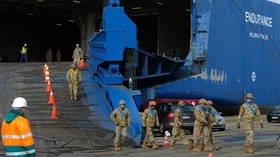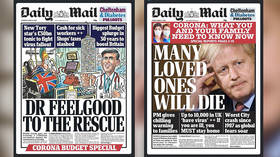Defeated by Covid-19? NATO’s biggest war drill 'Defender 2020' is at risk of being sneezed off

NATO had been preparing to stage its biggest military exercise in decades when it encountered a foe it was not apparently ready to face – coronavirus. Now, the drill is in jeopardy, while its true aim comes to the surface.
A large-scale exercise with the pompous name 'Defender Europe 2020' was expected to become the Alliance's biggest in a quarter of a century. Up to 20,000 US troops, together with some 17,000 more soldiers from 17 other NATO members, were scheduled to take part in the drill, which was about to be held in Germany, Poland and the Baltic states.
To be staged mainly between April and May, this training exercise was designed to supposedly promote peace through deterrence and to practice countering a hypothetical military aggression, and was aimed at demonstrating to Europeans that the Alliance is there to protect them against any threat – particularly if one imagines, let's say, Russia to be just that.
Also on rt.com NATO’s Defender Europe 2020 is war against Russia role-play, no matter what they tell youYet, instead, the would-be brave defenders of the Old Continent –together with the Europeans themselves– faced a threat of another nature, one they probably were not ready to deal with. The deadly novel coronavirus, officially known as Covid-19, has gripped many nations there, prompting the World Health Organization to declare Europe the new center of a pandemic.
Now, the drills' plan is cracking at the seams and it is increasingly unclear if the large-scale war games will take place at all. The US European Command already said earlier this week it would scale down America's participation in the exercise and modify it accordingly. The news comes on the heels of another drill cancellation, with Norway calling off another NATO exercise, all because of the fears of the pandemic.
So what does this whole situation tell us about the Alliance's capabilities … and goals?
Reasonable grounds
Let's be clear: NATO has not yet canceled Defender Europe 2020. Nor has the US pulled back from the event, for now at least. Yet this might well happen, analysts and former military officials told RT. "I would not be surprised if those exercises are postponed for several months," former Pentagon official Michael Maloof said, while a retired US Air Force Lieutenant Colonel Karen Kwiatkowski believed the drills could be either delayed or even canceled altogether.
And the Western nations might have good reasons for such a move, since, according to Kwiatkowski, soldiers might be needed at home, where they could help with cordoning off large quarantine areas or implementing martial law and controlling domestic population movements as part of the state of emergency.
Also on rt.com That’s how you spread panic! Ohio official backtracks on claim 100k people in state ALREADY carry coronavirusIf the situation with the deadly virus that has already claimed thousands of lives and infected over 140,000 people across the world worsens, the authorities might need the army to contain social tensions as well, the retired lieutenant colonel believes.
"Governments have fallen and collapsed on far less than what this pandemic has already delivered. And that fear is very likely the primary fear of governments, including the US government, and why no one wants their national troops in an overseas exercise at this time."
Apart from that, soldiers returning from overseas drills could themselves be a health risk, particularly if they come back from epidemic-stricken areas. "What we are trying to do is to keep everybody frozen to a place so we will try to keep rotations to a minimum. That is another reason why you are going to see minimal exercises, because all this moving people around will have a potential of spreading the virus," Maloof explains, adding that if any US personnel were sent to Europe for an exercise, they would have to "go through a mandatory two weeks" of quarantine.
Unprepared?
Another problem might well be that the NATO armies might turn out to be not quite prepared to fight even a simulated fight in the face of a very real risk – both in terms of equipment and psychology.
Also on rt.com Norway cancels NATO’s Arctic Cold Response exercises over coronavirus threatThe US troops "do receive training in biological warfare and have equipment for that," Maloof said, admitting, however, that he is not sure if "this equipment is sufficient to fight coronavirus in a battlefield environment" simply because Covid-19 is something the US military have never dealt with before.
The panic gripping ordinary citizens when they hear the news about the disease constantly conquering new grounds might turn out to be affecting the soldiers as well, Kwiatkowski notes. "Being prepared for battlefield toxins isn't the same as being prepared as a soldier for something that is already behind enemy lines, and is even in your own home town… the fear factor is real, perhaps more than the fear that is part of the life of combat troops."
Another dimension is that any drills of this scale are likely to involve a lot of meeting and talking and hand-shaking on the part of the NATO's top brass, who are arguably often in their twilight years. That means they would potentially expose themselves to a risk of infection – probably something they would very much like to avoid, Sergey Mikhailov, a senior fellow at the Russian Institute for Strategic Studies (RISI) reasons.
Also on rt.com How many #DefenderEurope troops does it take to clear fallen trees from a road? US & British troops show master class!"They could very well call off the drills if they consider an information about the risk of infection for all command staff members in Europe real," he told RT.
Image problems
Sending troops to supposedly disease-plagued areas for no real reason could also very well turn out a PR disaster for the Western leaders. "In our modern, peaceful times, an idea of deliberately putting soldiers' health and even lives at risk would hardly be welcomed," Mikhail Khodarenok, a retired colonel in the Russian Air Defense Forces and former General Staff officer, told RT. "The public both in the West and in the East would hardly understand and accept it," he warned.
The military analyst said that Washington and its allies would be extremely reluctant to take such a risk, since they have to consider electoral implications and public sentiments, which become all the more important ahead of the US presidential elections in particular.
Besides, taking image risks over an event that was largely designed as nothing other than one giant PR stunt in the first place would defeat its purpose, Mikhailov believes. That is not to mention that the drills would likely fail to reach their true goal, which is arguably to remind the world (and the Western public in the first instance) about the might and importance of the Alliance, now that the world is preoccupied with coronavirus concerns anyway.
Also on rt.com Merkel & Stoltenberg slam Macron’s ‘brain-dead NATO’ comment, insist rumors of bloc’s death greatly exaggerated"Such an event should instill confidence in allies and put pressure on adversaries," he explained, adding that now both NATO's allies and potential adversaries are too busy fighting the pandemic. Maloof also believes a global epidemic is a bad time to demonstrate one's strength or superiority.
"Coronavirus is a global problem," he said. "People have other things on their minds like survival and food. Whole countries are shutting down and going into isolation mode… it is what catches the attention of the people, it is not the military doing or not doing exercises."
Subscribe to RT newsletter to get stories the mainstream media won’t tell you.















